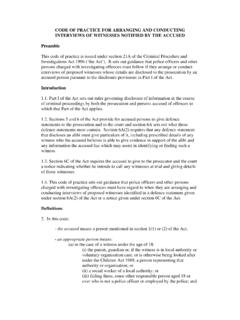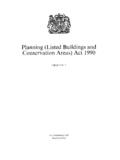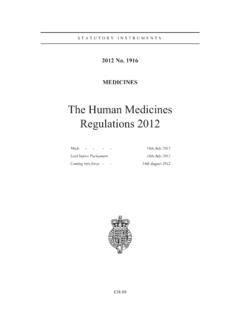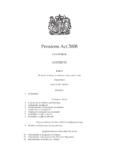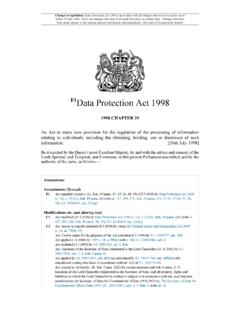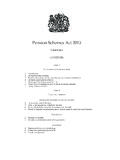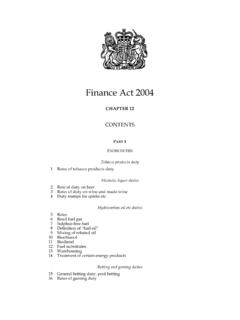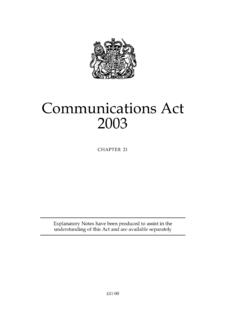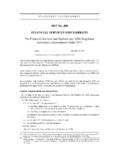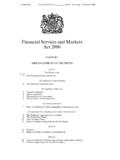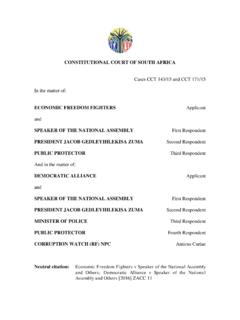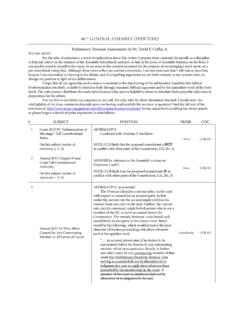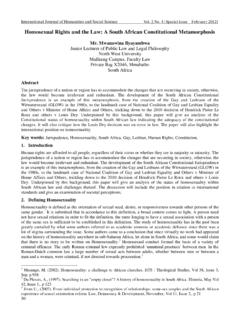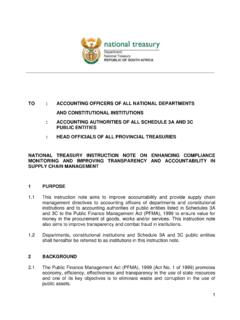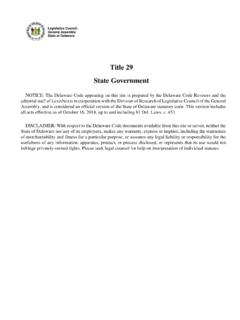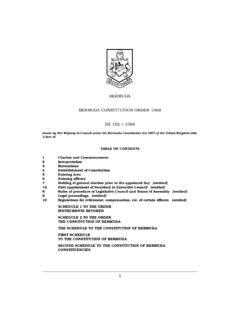Transcription of Constitutional Reform Act 2005 - legislation
1 Constitutional Reform Act 2005 CHAPTER 4 CONTENTSPART 1 THE RULE OF LAW1 The rule of lawPART 2 ARRANGEMENTS TO MODIFY THE OFFICE OF LORD CHANCELLORQ ualifications for office of Lord Chancellor2 Lord Chancellor to be qualified by experienceContinued judicial independence3 Guarantee of continued judicial independence4 Guarantee of continued judicial independence: Northern IrelandRepresentations by senior judges5 Representations to Parliament6 Representations to the Northern Ireland AssemblyJudiciary and courts in England and Wales7 President of the Courts of England and Wales8 Head and Deputy Head of Criminal Justice9 Head and Deputy Head of Family JusticeJudiciary and courts in Northern Ireland10 The Lord Chancellor and Northern Ireland courtsConstitutional Reform Act 2005 (c. 4)iv11 Lord Chief Justice of Northern IrelandOther provisions about the judiciary and courts12 Powers to make rules13 Powers to give directions14 Transfer of appointment functions to Her Majesty15 Other functions of the Lord Chancellor and organisation of the courts16 Functions of the Lord Chief Justice during vacancy or incapacityLord Chancellor s oath17 Lord Chancellor s oathSpeakership of the House of Lords18 Speakership of the House of LordsFunctions subject to transfer, modification or abolition19 Transfer, modification or abolition of functions by order20 Protected functions not transferable under Ministers of the Crown Act 197521 Amendment of Schedule 7 Supplementary22 Transfers.
2 SupplementaryPART 3 THE SUPREME COURTThe Supreme Court23 The Supreme Court24 First members of the CourtAppointment of judges25 Qualification for appointment26 Selection of members of the Court27 Selection process28 Report29 The Lord Chancellor s options30 Exercise of powers to reject or require reconsideration31 Selection following rejection or requirement to reconsiderTerms of appointment32 Oath of allegiance and judicial oath33 Tenure34 Salaries and allowances35 Resignation and retirement36 Medical retirementConstitutional Reform Act 2005 (c. 4)v37 PensionsActing judges38 Acting judges39 Supplementary panelJurisdiction, relation to other courts etc40 Jurisdiction41 Relation to other courts etcComposition for proceedings42 Composition43 Changes in compositionPractice and procedure44 Specially qualified advisers45 Making of rules46 Procedure after rules made47 Photography etcStaff and resources48 Chief executive49 Officers and staff50 Accommodation and other resources51 System to support Court in carrying on businessFees52 Fees53 Fees: supplementaryAnnual report54 Annual reportSupplementary55 Seal56 Records of the Supreme Court57 Proceedings under jurisdiction transferred to the Supreme Court58 Northern Ireland Act 1998.
3 Excepted and reserved matters relating to theSupreme Court59 Renaming of Supreme Courts of England and Wales and Northern Ireland60 Interpretation of Part 3 Constitutional Reform Act 2005 (c. 4)viPART 4 JUDICIAL APPOINTMENTS AND DISCIPLINECHAPTER 1 COMMISSION AND OMBUDSMAN61 The Judicial Appointments Commission62 Judicial Appointments and Conduct OmbudsmanCHAPTER 2 APPOINTMENTSG eneral provisions63 Merit and good character64 Encouragement of diversity65 Guidance about procedures66 Guidance: supplementaryLord Chief Justice and Heads of Division67 Selection of Lord Chief Justice and Heads of Division68 Duty to fill vacancies69 Request for selection70 Selection process71 Selection panel72 Report73 The Lord Chancellor s options74 Exercise of powers to reject or require reconsideration75 Selection following rejection or requirement to reconsiderLords Justices of Appeal76 Selection of Lords Justices of Appeal77 Duty to fill vacancies78 Request for selection79 Selection process80 Selection panel81 Report82 The Lord Chancellor s options83 Exercise of powers to reject or require reconsideration84 Selection following rejection or requirement to reconsiderPuisne judges and other office holders85 Selection of puisne judges and other office holders86 Duty to fill vacancies87 Request for selection88 Selection
4 Process89 Report90 The Lord Chancellor s optionsConstitutional Reform Act 2005 (c. 4)vii91 Exercise of powers to reject or require reconsideration92 Selection following rejection or requirement to reconsider93 Reconsideration of decision not to select94 Duty to identify persons for future requestsSupplementary provisions about selection95 Withdrawal and modification of requests96 Effect of acceptance of selection97 Scotland and Northern IrelandAssistance in connection with other appointments98 Assistance in connection with other appointmentsComplaints and references99 Complaints: interpretation100 Complaints to the Commission or the Lord Chancellor101 Complaints to the Ombudsman102 Report and recommendations103 Report procedure104 References by the Lord Chancellor105 InformationMiscellaneous106 Consultation on appointment of lay justices107 Disclosure of information to the CommissionCHAPTER 3 DISCIPLINED isciplinary powers108 Disciplinary powers109 Disciplinary powers: interpretationApplications for review and references110 Applications to the Ombudsman111 Review by the Ombudsman112 Reports on reviews113 References to the Ombudsman relating to conduct114 Reports on referencesGeneral115 Regulations about procedures116 Contents of regulations117 Procedural rules118 Extension of discipline provisions to other offices119 Delegation of functionsConstitutional Reform Act 2005 (c.)
5 4)viiiScotland and Northern Ireland120 Scotland121 Northern IrelandCHAPTER 4 INTERPRETATION OF PART 4122 Interpretation of Part 4 PART 5 JUDICIAL APPOINTMENTS AND REMOVALS: NORTHERN IRELANDCHAPTER 1 APPOINTMENTSD isclosure of information to Commission123 Disclosure of information to the Northern Ireland Judicial AppointmentsCommissionOmbudsman124 Northern Ireland Judicial Appointments OmbudsmanComplaints and references125 Complaints: interpretation126 Complaints to the Commission or the Lord Chancellor127 Complaints to the Ombudsman128 Report and recommendations129 Report procedure130 References by the Lord Chancellor131 Information132 Confidentiality in relation to judicial appointments and disciplineCHAPTER 2 REMOVALS133 Removal from most senior judicial offices134 Removal from listed judicial offices135 Tribunals for considering removal136 Interpretation of Part 5 PART 6 OTHER PROVISIONS RELATING TO THE JUDICIARY137 Parliamentary disqualification138 Judicial Committee of the Privy CouncilConstitutional Reform Act 2005 (c.
6 4)ixPART 7 GENERAL139 Confidentiality140 Enactment 141 Subordinate legislation 142 General interpretation143 Supplementary provision etc144 Orders and regulations145 Minor and consequential amendments146 Repeals and revocations147 Extent148 Commencement149 Short titleSchedule 1 Powers to make rulesPart 1 The processPart 2 Rule-making powers subject to the process in Part 1 Schedule 2 Powers to give directionsPart 1 The processPart 2 Powers of direction subject to the process in Part 1 Schedule 3 Transfer of appointment functions to Her MajestySchedule 4 Other functions of the Lord Chancellor and organisation of thecourtsPart 1 AmendmentsPart 2 Amendments of or relating to enactments repealed oramended otherwise than by this ActSchedule 5 Functions under legislation relating to
7 Northern IrelandPart 1 AmendmentsPart 2 Amendments relating to enactments repealed or amendedotherwise than by this ActSchedule 6 Speakership of the House of LordsSchedule 7 Protected functions of the Lord ChancellorSchedule 8 Supreme Court selection commissionsPart 1 MembershipPart 2 DissolutionPart 3 Duty to convene commission: special rulesSchedule 9 Amendments relating to jurisdiction of the Supreme CourtPart 1 Jurisdiction transferred from the House of LordsPart 2 Devolution jurisdictionSchedule 10 Proceedings under jurisdiction transferred to Supreme CourtSchedule 11 Renaming of the Supreme Courts of England and Wales andNorthern IrelandPart 1 Citation of Acts and RulesPart 2 Miscellaneous amendments: Supreme Court of England andWalesPart 3 Miscellaneous amendments: Supreme Court of Judicature ofNorthern IrelandPart 4 Specific AmendmentsSchedule 12 The Judicial Appointments CommissionConstitutional Reform Act 2005 (c.)
8 4)xPart 1 The CommissionersPart 2 The CommissionSchedule 13 The Judicial Appointments and Conduct OmbudsmanSchedule 14 The Judicial Appointments Commission: Relevant Offices andEnactmentsPart 1 Appointments by Her MajestyPart 2 Appointments by the Lord Chancellor: Offices to whichparagraph 2(2)(d) of Schedule 12 does not applyPart 3 Appointments by the Lord Chancellor: offices to whichparagraph 2(2)(d) of Schedule 12 appliesSchedule 15 Northern Ireland Judicial Appointments OmbudsmanSchedule 16 Judicial Committee of the Privy CouncilSchedule 17 Minor and consequential amendmentsPart 1 The Lord ChancellorPart 2 Amendments relating to Part 3 Part 3 Northern IrelandSchedule 18 Repeals and revocationsPart 1 Powers to make rulesPart 2 Judiciary-related functions and organisation of the courtsPart 3 Functions under legislation relating to Northern IrelandPart 4 The Lord Chancellor: minor and consequentialPart 5 Supreme CourtPart 6 Judicial Committee of the Privy CouncilELIZABETH IIc.
9 4 Constitutional Reform Act 20052005 CHAPTER 4An Act to make provision for modifying the office of Lord Chancellor, and tomake provision relating to the functions of that office; to establish a SupremeCourt of the United Kingdom, and to abolish the appellate jurisdiction of theHouse of Lords; to make provision about the jurisdiction of the JudicialCommittee of the Privy Council and the judicial functions of the President ofthe Council; to make other provision about the judiciary, their appointmentand discipline; and for connected purposes.[24th March 2005 ]E IT ENACTED by the Queen s most Excellent Majesty, by and with the advice andconsent of the Lords Spiritual and Temporal, and Commons, in this presentParliament assembled, and by the authority of the same, as follows: PART 1 THE RULE OF LAW1 The rule of lawThis Act does not adversely affect (a)the existing Constitutional principle of the rule of law, or(b)the Lord Chancellor s existing Constitutional role in relation to Reform Act 2005 (c.)
10 4)Part 2 Arrangements to modify the office of Lord Chancellor2 PART 2 ARRANGEMENTS TO MODIFY THE OFFICE OF LORD CHANCELLORQ ualifications for office of Lord Chancellor2 Lord Chancellor to be qualified by experience(1)A person may not be recommended for appointment as Lord Chancellor unlesshe appears to the Prime Minister to be qualified by experience.(2)The Prime Minister may take into account any of these (a)experience as a Minister of the Crown;(b)experience as a member of either House of Parliament;(c)experience as a qualifying practitioner;(d)experience as a teacher of law in a university;(e)other experience that the Prime Minister considers relevant.(3)In this section qualifying practitioner means any of these (a)a person who has a Senior Courts qualification, within the meaning ofsection 71 of the Courts and Legal Services Act 1990 (c.
